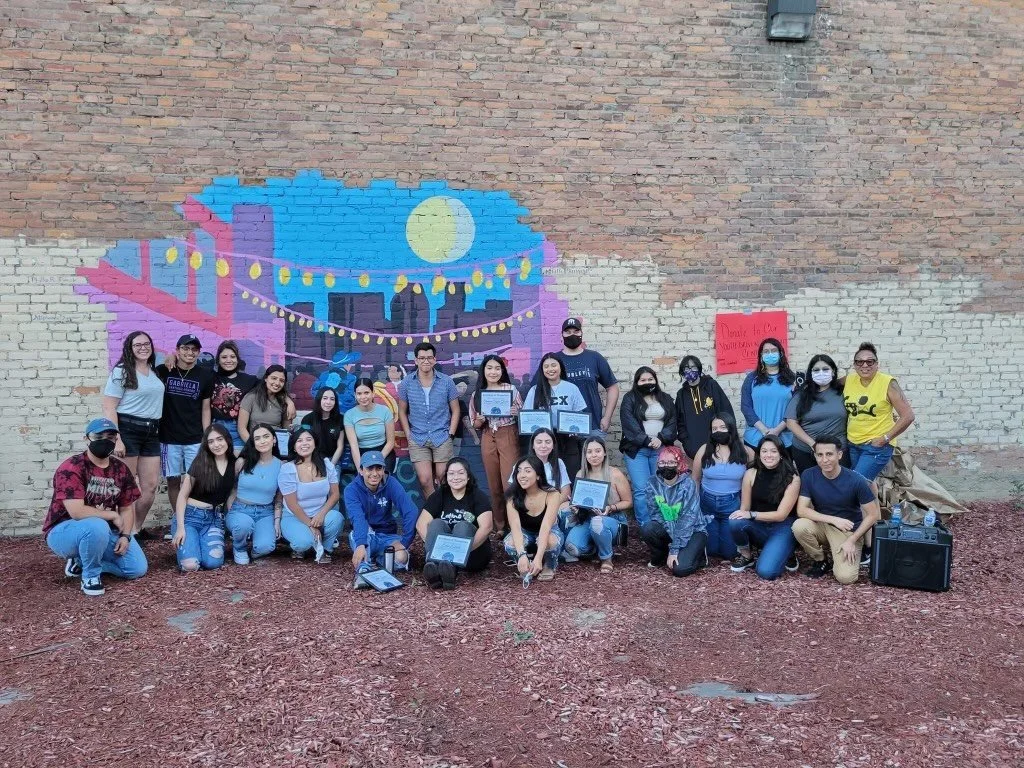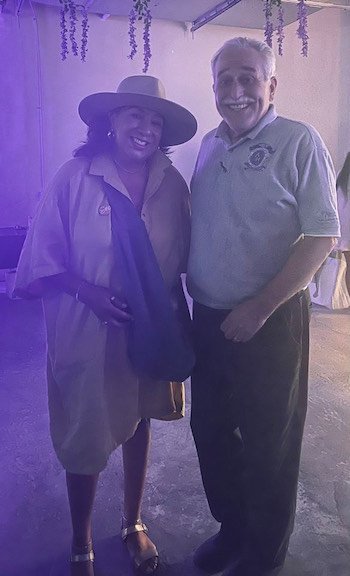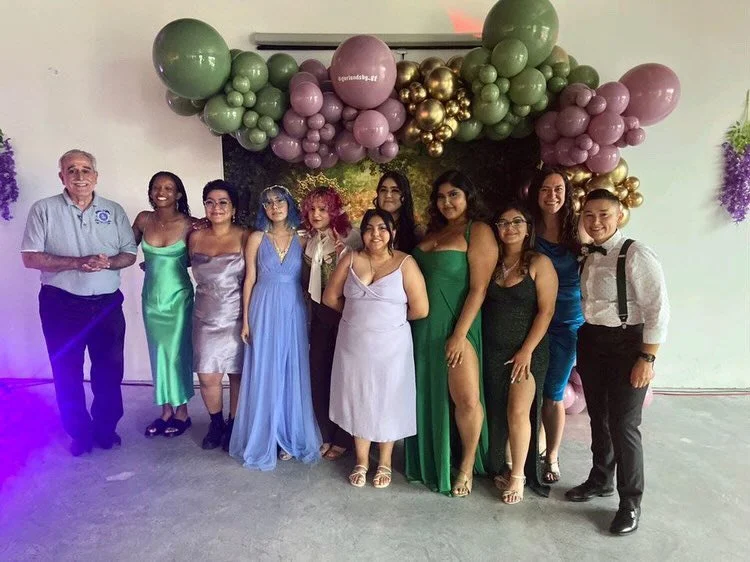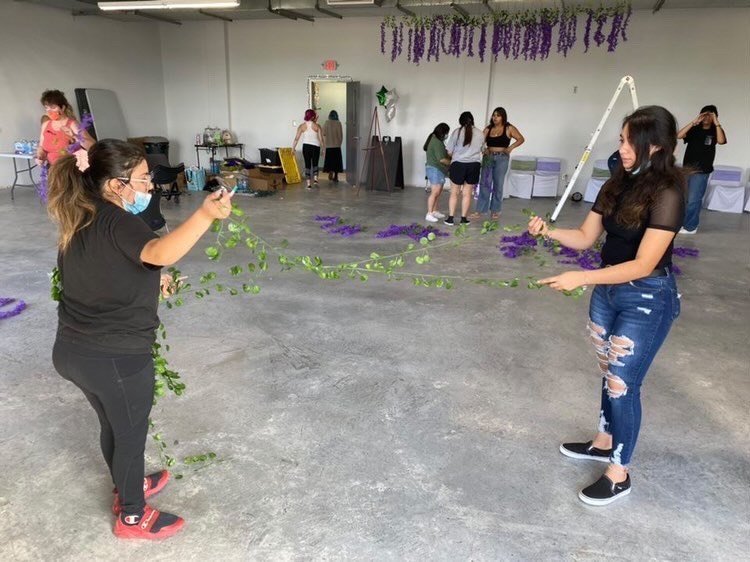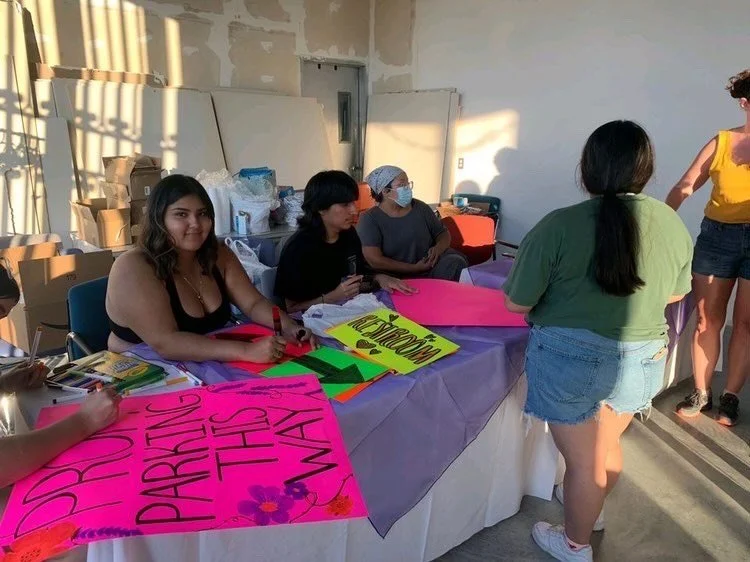For Over a Decade, Maria Anita Salinas Has Worked to Build Strength in Southwest Detroit
The nonprofit Congress of Communities was founded in Southwest Detroit by Maria Anita Salinas who helped her community grow stronger out of love and advocacy.
By Angela Martinez
Maria Anita Salinas, a 62-year-old community organizer, was considered a rebellious teenager in Southwest Detroit during the ‘70s. She would skip school, she was at the wrong reading level and she had a low GPA. Yet Salinas graduated from high school and headed to college, despite her rebelliousness.
A Youth Council mural project at the Senate Theater in Southwest Detroit in 2020. Courtesy Maria Anita Salinas
Salinas founded the nonprofit Congress of Communities in 2010. The organization helps with leadership development, community organizing and advocacy for all youth and residents in Southwest Detroit. The organization offers different programs such as the youth council for Latinx teenagers; TANN (Taking Action por Nuestros Niños), which is a leadership program that provides resources and opportunities for women and mothers to become better leaders; the Lavender Society, a LGBTQ+ club; and more. The impact Salinas hopes to have for residents in Southwest Detroit is to be an example, to be a model that people can trust and to keep expanding in the community. She wants people to trust that the CoC will never forget about their Hispanic and Latino community.
Salinas attended college with little academic knowledge and figured out that she was a smart woman, leading her to earn a degree. “Coming from immigrant parents, I always had a different view, and I didn’t fit the square. I spoke up about it, and I was pegged kind of a troublemaker. Little did I know, I wasn’t a troublemaker. I was an advocate,” Salinas says. Salinas then worked at the University of Michigan School of Public Health, where she learned about injustices in Southwest Detroit.
Maria Anita Salinas and Raymond Lozano at the Queer Prom. Photo by Lindsey Matson
Salinas had a passion for community organizing and listening to younger people’s ideas as she started to help around Southwest neighborhoods. She familiarized herself with the community, working with the Michigan governor, Detroit mayor, city council, education boards and more. She received offers to become a director in many places, but she would refuse. “I picked people over politics. I wanted to stay with my people and really help them through a lot of the downfall of Detroit,” Salinas says.
Bianca Meza, a 17-year-old part of the Youth Council and Lavender Society in CoC, joined during the 2021-2022 school year after a friend recommended them to join.
“We cover a lot of social justice issues, and it feels nice having a group of people who you can talk to about that sort of thing. The CoC really gets to get in depth with a lot of these topics and you learn a lot from it. My experience has just been really good with the CoC. I’m really happy with what I learned and what I take from it,” Meza says.
In 2006 Salinas was hired by the Skillman Foundation to help launch a $120 million initiative – called the Good Neighborhood Initiative – in six neighborhoods in Detroit. GNI wanted to work with Salinas to help a community, and she chose to work with Mexicantown. Over 10,000 people were involved with the CoC, which held big community meetings with over 300 people. Salinas and other residents would go door to door to convince people to join their meetings to discuss better resources, education and safety matters in the neighborhood.
Salinas says she focuses on three things when working in Southwest: condition change, which involves getting better water, electricity and garbage pickup; system change, which involves education, medical fields, universities and fighting against politics; and mind change, which involves changing residents’ minds to not keep quiet and to speak up for their rights.
Representatives of the Queer Prom, CoC’s Lavender Society, DAYUM and Prism. Photo by Yvonne Naverrete from We the People Michigan
“In the past, we’ve been too humbled as a culture in Southwest Detroit. So, that’s been the hardest thing for me was trying to help shift that mindset,” Salinas says. “If we all just got up as Latinos in Southwest Detroit and showed up for something, nobody could stand up to us, nobody.”
Aaliyah Figueroa, 17, of Southwest Detroit, says CoC pays attention to her neighborhood. “I think it’s a great thing that the organization is caring about the community because it’ll bring more opportunities and experience to the people,” she says.
On Aug. 13, the CoC’s Lavender Society hosted their first Queer Prom at Mexicantown’s Plaza Del Norte Welcome Center. The prom’s theme was “Enchanted Forest” and included a drag show, photo booths, a chill room to take a break from the dance, arts and scraps to make corsages, and more.
“Our goal is to make it a safe space for anyone who identify as anything, to be who they are and to have the comfortability to express themselves how they want. They don’t have to be scared to have anyone hate crime them,” Meza says. “They can just come as who they are, and it’ll be completely OK. They’ll be welcomed with open arms.”
When asked about her thoughts on the Queer Prom, Figueroa said, “Kudos to them because they really thought this through. They’re spreading awareness and new experiences.”
The Youth Council, Lavender Society and adult volunteers decorating for the Queer Prom. Photo by Lindsey Matson
The Youth Council, Lavender Society and adult volunteers setting up signs and posters for the Queer Prom. Photo by Lindsey Matson
Salinas says there’s a need for older people to be educated about the LGBTQ community. “This has always been around, but it was always hidden,” Salinas says. “A lot of (older people) say prerogative things in Spanish or English, but they don’t know that they’re hurting someone.”
She wants to keep bringing awareness and more platforms for the LGBTQ community, as it’s needed. Regarding the Queer Prom, Salinas says, “We’re doing it with class, with love and in good spirits.”
“I succeeded in everything I did because I loved my culture, my community and I loved what I did,” Salinas says. “I want to motivate ladies that you can do it too. If you work hard and you love what you do, the world is yours.”
Get Involved:
Visit congressofcommunities.com to learn more.

